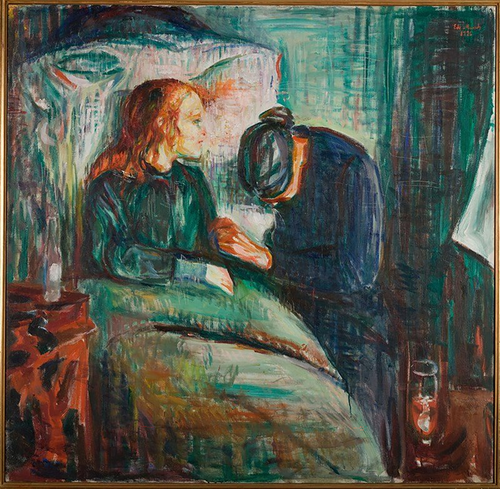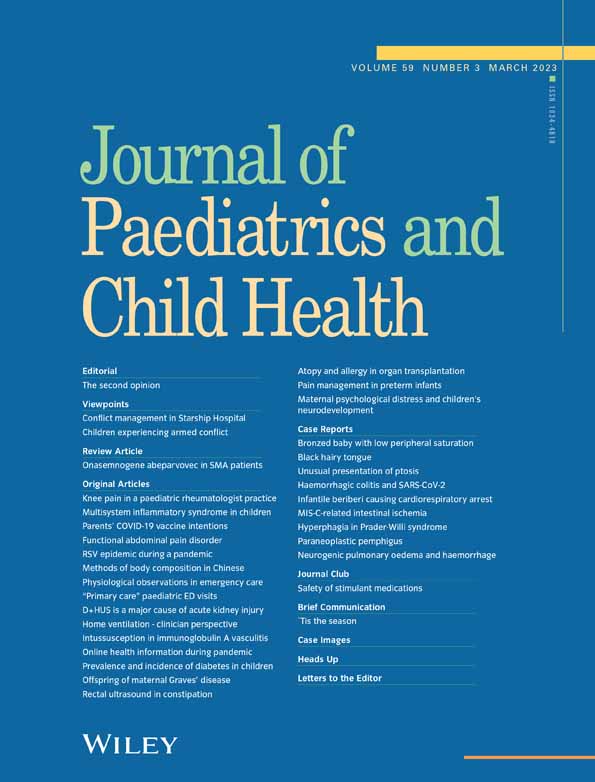The second opinion
When the parents of a child patient (Fig. 1) say to you: ‘I want a second opinion’, we all know we should agree with good grace. Yet, no matter how much we have thought through the need to respect requests for second opinions, there is a good chance the request will hurt our professional pride. We have spent many years learning clinical skills and expertise, including the importance of trust between a physician and a child and her parents. The request for a second opinion can feel like the parents are saying: ‘We don't trust your opinion’.

People can mean many different things by a "second opinion", and the dynamics can be complex. Although definitions vary, the essential message is that a second physician, in the same specialty, is consulted for an opinion about a patient's diagnosis or treatment. This distinguishes the second opinion from a consultation sought from a colleague from a different specialty. It is debatable whether a specialist asking a colleague in the same specialty from the same institution about a patient constitutes asking for a second opinion. The more common understanding of the term is that the patient or a relative has requested the second opinion. There are limited data on the reasons, but in paediatric oncology at least, most of the 25% of families who asked for a second opinion wanted confirmation about the treatment protocol and the professional level of the haematologist/oncologist, the surgeon and the institution.1
- The patient has the right to choose freely and change his/her physician and hospital or health service institution, regardless of whether they are based in the private or public sector.
- The patient has the right to ask for the opinion of another physician at any stage.
However, there is no legal right to a second opinion. The Australian Medical Association Code of Medical Ethics3 merely states that a physician looking after a patient should ‘assure the patient that he or she may seek a second opinion or choose someone else to provide a recommended consultation or service’. If a practitioner feels unable to accede to a parent's request on conscientious grounds, when another practitioner might reasonably differ, there is a moral obligation on the practitioner to offer a second opinion.4
So, if a family asks for a second opinion, we should hush our narcissistic self, try not to take umbrage, and reflect. If possible, ask the family in a non-combative way what it is they are seeking. Are the parents asking for a second opinion about the facts, for example the accuracy of the diagnosis or the optimal management, or are they asking for a value judgement of what should be done?4, 5 Whether or not we have a good working relationship with the family, whether or not we are convinced we know better than the family, we should try to work out how best to give them the second opinion they request. The next critical decision is whom to ask for a second opinion. In a small field of expertise, this can be a problem. Should the primary physician or the parents find the second opinion? Ideally, the person giving the second opinion should be ‘independent’, presumably meaning they should come from another institution, but the primary physician is likely to know them well. Someone will have to provide the person giving the second opinion with some background information about the case. If the provider of information is the primary care physician, it will be difficult to give that information in a way that does not bias the person giving the second opinion. Indeed, the primary physician is usually in a position of power to influence the second opinion, illustrating a power differential between doctor and patient which may be one of the very things that concerned the patient's family.
However sure we are, we can all make mistakes. When reviewing contemporary UK cases which resulted in intractable conflict between parents and physicians, including that of Charlie Gard, lawyer Neera Bhatia reported the case of Ashya King.6 In 2014, at age 4 years, Ashya was diagnosed with a medulloblastoma. After surgical removal, his parents requested proton beam therapy, a treatment they found on the internet and thought was safer than conventional radiotherapy. Southampton Hospital demurred and referred the case to the National Health Service (NHS) England Proton Clinical Reference Panel, who declined the request as unlikely to benefit Ashya. Ashya's parents took him out of hospital unbeknownst to staff, fled overseas to obtain the treatment, but were detained in Spain and returned forcibly to the UK. The UK High Court found the parents' request for proton beam therapy to be ‘reasonable’, so Ashya was given proton beam therapy, funded by the NHS. Follow-up magnetic resonance imaging scans have shown no residual tumour, Ashya returned to school, and has apparently remained well and disease-free since. Subsequently, the NHS does provide proton beam therapy to children like Ashya with medulloblastoma.
One word of advice. If a parent phones you about their child who is already a patient under the care of another physician, it is very unwise to give advice without talking to the primary physician first . It is advisable to formalise the second opinion to ensure that the person giving the opinion has all the relevant information.5
Even if a reflective physician is convinced that they are making a sound decision, they should consider how best to avoid influencing the second opinion in a way that denies the family genuine choice. Humility is one of the physician's least prized but most important core values. We should all fight against our own arrogance, admit to ourselves we can be wrong, and be open to second opinions.
Acknowledgement
I thank Stephen Isaacs, Ameneh Khatami, Henry Kilham, Ken Nunn and Anne Preisz for helpful feedback.




